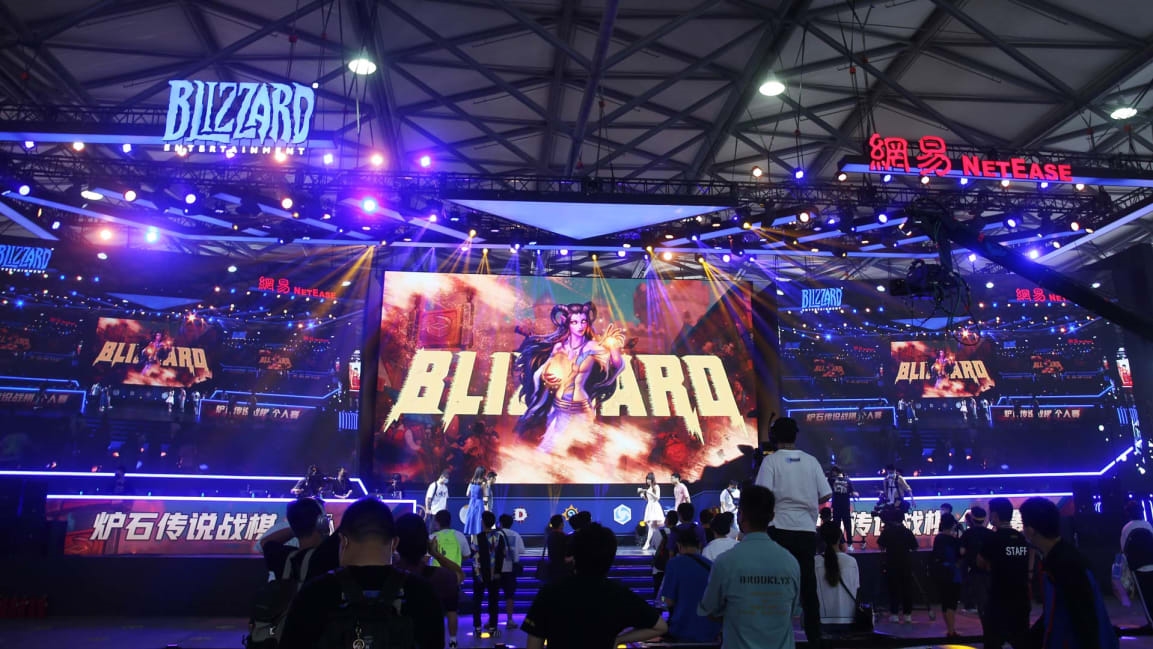Why Activision Blizzard finds itself in the DOJ and SEC’s crosshairs
Embattled video game maker Activision Blizzard is once again in hot water, this time over allegations of insider trading. Late last week, the company announced that it had received a grand jury subpoena from the U.S. Department of Justice, as well as a request for information from the Securities and Exchange Commission, both related to the question of whether three Activision investors engaged in insider trading just days before the company announced its sale to Microsoft for $68.7 billion. In a legal filing released last Friday, Activision said that it would be fully cooperative with both investigations.
The three investors under question–Barry Diller, David Geffen, and Alexander von Furstenberg–each increased their positions in Activision just four days prior to the announcement of the Microsoft deal, purchasing options priced at $40 each. Activision’s share price rose to over $80 less than a week later, upon announcement of the deal with Microsoft. Regulators are now interested in whether the men, who are friendly with Activision’s CEO Bobby Kotick, had received insider information that influenced their decision to purchase the shares. Diller and Kotick both serve on the board of Coca-Cola together, while Diller and Geffen have been longtime friends who began their careers together in the William Morris mailroom. Von Furstenberg is Diller’s son-in-law by marriage.mn bv
A blizzard of scandals
Activision, the entertainment and gaming behemoth behind Call of Duty, World of Warcraft, and Candy Crush Saga, has found itself in a string of controversies over recent months. Days after the company announced that it would be cooperating with the government’s dual investigations, the Wall Street Journal reported on Thursday that Kotick’s former girlfriend and current Facebook COO, Sheryl Sandberg, had potentially used her influence on two separate occasions to kill two stories about Kotick at the MailOnline, the digital arm of The Daily Mail. Both stories concerned a restraining order that a previous girlfriend of Kotick’s had taken out against the Activision CEO in 2014 after their relationship ended. The restraining order was later dropped. Both Kotick and Sandberg have denied the allegations that Sandberg used Facebook’s influence over MailOnline‘s digital traffic to have the stories shelved.
Activision was also at the center of a storm last summer, when the California Department of Fair Employment and Housing (DFEH) sued the company over what it described as a “frat boy work culture.” According to the department, company executives routinely engaged in sexual harassment of female employees, groped and harassed them during company events, and routinely paid female employees less than men, while furnishing fewer opportunities for promotions. One of the most damning allegations in the lawsuit regarded a female employee who committed suicide on a business trip, in relation to a relationship with a male supervisor. According to the filing, male employees at Activision had also shared explicit images of the woman without her consent.
The allegations spawned widespread turmoil within Activision, leading to a walkout in November of more than 1,000 employees, with thousands more signing an open letter to Kotick demanding change. The lawsuit and the employee reaction caused Activision’s stock to plunge last summer. After initially referring to California’s lawsuit as meritless, under mounting pressure Activision announced that it was committing $250 million to hiring more women, nonbinary people, and those from underrepresented communities. It also set ambitious goals to increase its percentage of female and nonbinary employees to 50% of headcount, up from its current numbers at 23% out of a workforce of roughly 10,000 employees. It also adopted a zero-tolerance harassment policy, and waived a clause requiring mandatory arbitration for sexual harassment and discrimination claims brought against the company.
Earlier this year, Activision reached an $18 million settlement with the Equal Employment Opportunity Commission in relation to the allegations, though the case brought by California’s DFEH is still ongoing.
Industry-wide growth, and heightened scrutiny
For Activision, the investigation comes at a time when the gaming industry is facing historic growth spurts across the entertainment, video game, and e-sports ecosystems. According to Insider Intelligence, consumers spent $44 billion in 2021 on gaming software and services. While Activision Blizzard remains one of the largest players in the gaming industry, other gaming companies including Nintendo, Electronic Arts, and Twitch remain major players in the space. The pandemic-boosted bump in casual gamers has also led more traditional media companies to dip a toe into the white-hot industry. Netflix, for example, launched a small suite of mobile games in 2021, and continues to expand on its lineup.
Kotick has been at the helm of Activision since 1991, taking the company through a bankruptcy restructuring, only to build it into one of the largest gaming companies in the world. In addition to making a number of profitable early acquisitions, Kotick also oversaw Activision’s 2008 merger with Vivendi Games, cementing the newly assembled Activision Blizzard’s in the massively profitable world of multiplayer online gaming.
The insider trading allegations now imperil the future of Activision’s handsomely compensated CEO. Prior to California’s lawsuit, Activision’s board found itself under fire for approving a $155 million pay package for Kotick in the spring of 2021, making him one of the highest-paid CEOs in the country. The increase to Kotick’s salary came despite layoffs throughout the company’s ranks in both 2020 and 2021. The board argued that Kotick had increased Activision’s value from a $10 million market capitalization to one over $70 billion, and the salary increase narrowly passed a shareholder vote. In its recent filing, Activision added a line noting that Kotick’s employment upon completion of the merger had yet to be discussed or even negotiated between Kotick and Microsoft.
The SEC and DOJ civil and criminal investigations into the trade coincide with a period of increased government scrutiny into the financial practices of banks and corporations. In recent months, the commission has opened probes into Amazon’s business practices, Elon Musk’s Tesla stock sales, and a number of blank-check SPAC deals. The SEC in particular has taken a harder look at corporate regulations and enforcement under its current chair, Gary Gensler, who was appointed to lead the organization by President Biden a year ago.
“Under Jay Clayton, the former [SEC] commissioner, the focus was more on revising existing regulations to promote capital formation. Under Gensler’s helm, the focus is more on investor protection,” says Vanderbilt University Law School professor Amanda Rose, an expert in corporate governance and securities law. According to Rose, it’s unlikely that Activision as a company will find itself implicated in the scandal, though Kotick and the three investors could find themselves liable in both civil and criminal proceedings.
While Diller has claimed that the trade was “a lucky bet” and that he wouldn’t have “[waited] until [he] was 80 to participate in so obvious a fraud,” Rose says that both the SEC and DOJ may still be able to find evidence of intentional sharing of material, non-public information.
“Let’s say they went to breakfast and Bobby looked tired and the investors were able to deduce it. Body languages, winks, and nods can convey material information,” says Rose. “Just because you don’t verbalize something doesn’t mean you’re not guilty of insider training.”
Yet if Diller, Geffen, and von Furstenberg were able to make their lucky bet without Kotick purposefully letting his emotions convey what was to come, the government’s case becomes more challenging, says Rose. “The tippee can only be liable if there was an initial breach of obligations to the company by the insider,” she says. “So, that’s a difficulty the government will have to confront.”
(41)



